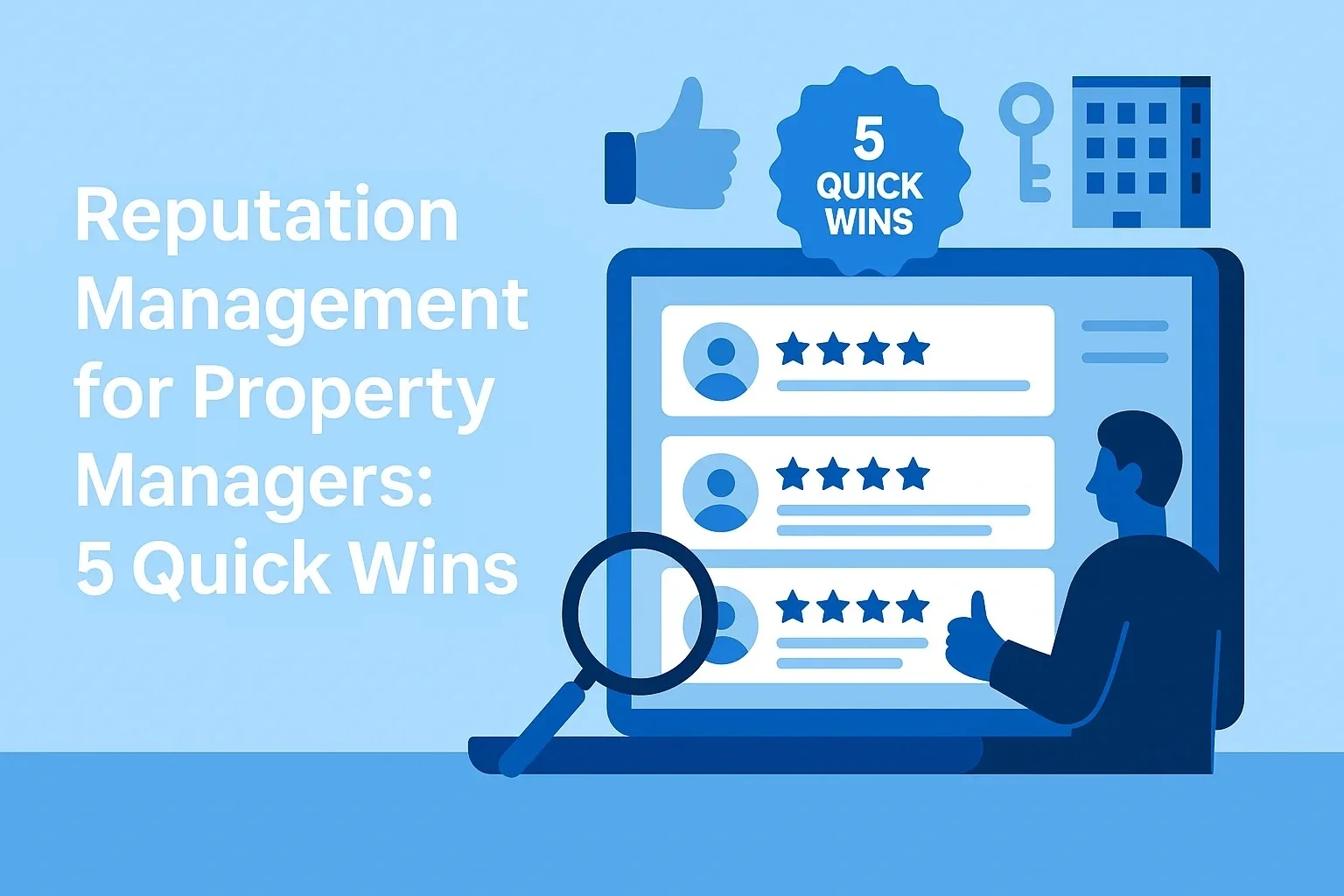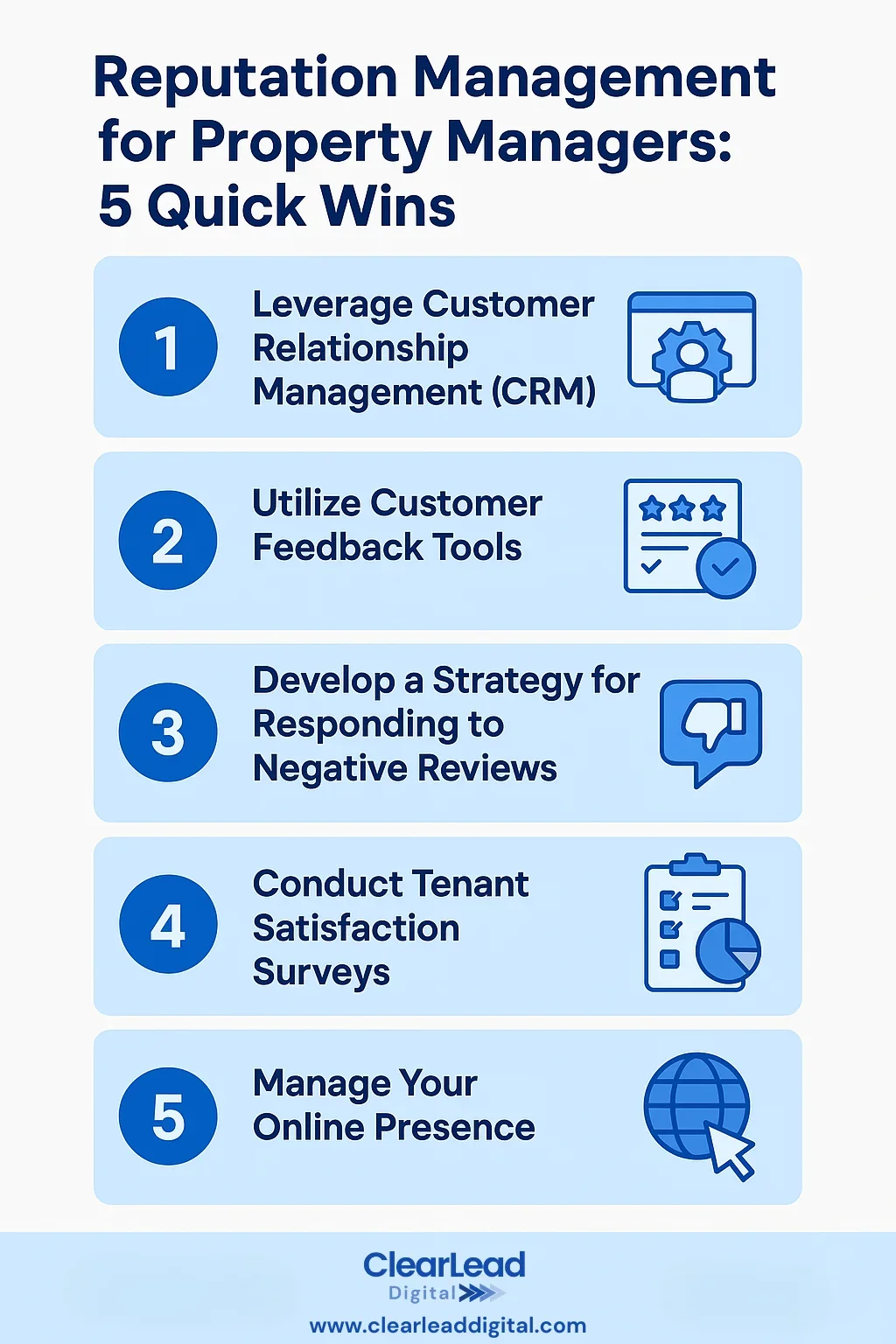Reputation Management for Property Managers: 5 Quick Wins
Reputation management for property managers is crucial for attracting tenants and maintaining a strong property management reputation. This blog shares five essential tips—including using customer feedback tools and responding to negative reviews—to help you manage your online presence effectively.
Understanding Property Management Reputation
Importance of Reputation in Property Management
Your reputation as a property manager affects everything—from tenant retention to attracting new clients. A solid reputation builds trust and credibility, which can reduce vacancy rates and lead to higher tenant satisfaction. On the other hand, a damaged reputation can cause you to lose business and face costly repairs in reputation repair strategies.
Because property management is a service-driven industry, how you’re perceived impacts your bottom line more than ever.
Factors Influencing Your Reputation
Several factors shape your property management reputation:
Quality of communication with tenants
Responsiveness to maintenance requests
Transparency in billing and policies
Online reviews and ratings
Social media presence
Overall tenant satisfaction
Understanding these elements helps you focus on what truly matters to tenants and owners alike.
Tip 1: Leverage Customer Relationship Management (CRM)
Benefits of Using CRM Tools
Customer relationship management (CRM) systems are more than just contact lists. For property managers, CRMs help organize tenant info, track communications, and schedule follow-ups. They make managing relationships smoother and more personal.
The benefits include:
Streamlined communication with tenants and owners
Automated reminders for lease renewals and maintenance
Centralized data to understand tenant history and preferences
Integrating CRM with Reputation Management
A CRM can be the backbone of your reputation management. By keeping track of tenant interactions and feedback, you can identify potential issues early, resolve problems faster, and maintain a consistent, positive tenant experience. Integrate your CRM with your customer feedback tools to close the loop on satisfaction and build trust.
Tip 2: Utilize Customer Feedback Tools
Types of Feedback Tools for Property Managers
Collecting feedback is crucial. The right tools make it easy to gather insights without bothering tenants. Some popular feedback tools include:
Online surveys
In-app feedback forms
Email questionnaires
Review platforms like Google My Business and Yelp
Analyzing Feedback for Improvement
Feedback isn’t just for collecting praise. It reveals areas for improvement and helps you spot trends in tenant concerns. Use the data to prioritize maintenance issues, improve communication, or tweak policies. Regular analysis of feedback supports ongoing reputation management and enhances tenant satisfaction.
Tip 3: Develop a Strategy for Responding to Negative Reviews
How to Respond Effectively
Negative reviews are inevitable but how you respond makes a difference. Start by acknowledging the tenant’s concern without being defensive. Show empathy and offer solutions or invite the tenant to discuss offline. This approach not only solves problems but also signals to others that you care about tenant experience.
Importance of Timeliness in Responses
Speed matters. Responding quickly to negative reviews prevents situations from escalating and shows that you are attentive. Aim to reply within 24-48 hours. Timely responses contribute to managing online presence positively and can even turn a negative review into a loyal tenant.
Tip 4: Conduct Tenant Satisfaction Surveys
Crafting Effective Surveys
Tenant satisfaction surveys are a powerful way to measure how happy your tenants are. To get useful insights, keep surveys short and focused on key areas like maintenance, communication, and safety. Use a mix of multiple-choice and open-ended questions to capture quantitative and qualitative data.
Using Survey Results to Enhance Reputation
Once you collect survey data, share the highlights with your team and set action plans. Address common complaints promptly and celebrate improvements publicly. This transparency builds trust and encourages tenant loyalty, improving your property management reputation over time.
Tip 5: Manage Your Online Presence
Strategies for Maintaining a Strong Digital Footprint
Your online presence extends beyond reviews. It includes your website, social media profiles, and any digital marketing for property managers efforts. Regularly update your website with helpful content, post engaging updates on social channels, and encourage satisfied tenants to share their experiences online.
Importance of Digital Marketing for Property Managers
Digital marketing isn’t just for big brands. For property managers, it helps you showcase your properties, share tenant success stories, and rank higher in search results. Combining SEO, social media, and email marketing ensures you reach your audience where they spend most of their time.
Conclusion
Reputation management for property managers isn’t a one-time task—it’s an ongoing process. By leveraging CRM systems, utilizing customer feedback tools, responding thoughtfully to reviews, conducting tenant satisfaction surveys, and managing your online presence, you can build a strong reputation that drives growth.
Start with these five tips and watch your tenant relationships and property occupancy improve. Staying proactive will help you handle challenges before they become bigger issues, keeping your property management reputation solid and trustworthy.
FAQ
-
It influences tenant retention, attracts new clients, and builds trust, which is critical in a service-based industry.
-
Online surveys, review platforms like Google My Business, and email questionnaires work well for collecting tenant insights.
-
Ideally, respond within 24-48 hours to show attentiveness and willingness to resolve issues.
-
They provide actionable data on tenant concerns, helping you address problems and enhance overall satisfaction.
-
It helps maintain visibility, share positive tenant stories, and improve search rankings, supporting your overall reputation online.
Learn what’s working in PM SEO strategy right now - now theory, just results.


